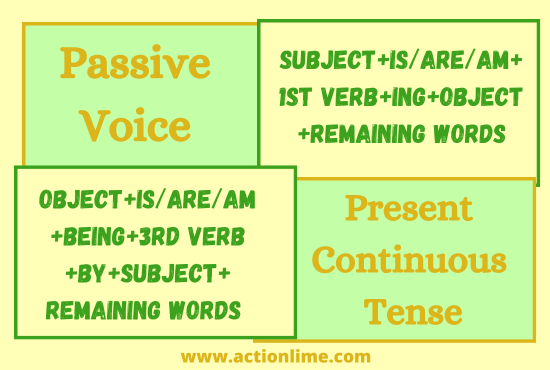Present Indefinite Tense| Use, Rules, Formula, Examples
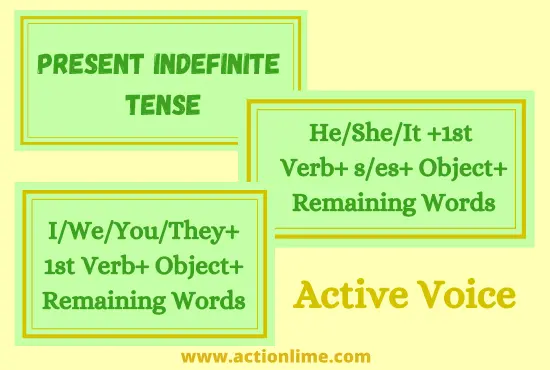
Present Indefinite Tense or Simple Present Tense can be explained as that type of present tense in which Verb is used to indicate the actions that are practiced regularly. It means that daily life actions that are carried out regularly, can be represented in Present Indefinite Tense or Simple Present Tense.
Rules to form Present Indefinite Tense Sentences
Following are some rules that must be followed to form Present Indefinite Tense or Simple Present Tense Sentences.
- First, write the Subject or doer of the action.
- In Assertive Sentences, if a Plural Number of Nouns or Pronouns (I, We, You, They) is used as a Subject, use 1st Verb.
- However, in Assertive Sentences, if Singular Number Nouns or Pronouns (He, She, It) are used as Subjects, add “s/es” with 1st Verb.
- But in the case of Negative, Interrogative, and Negative-Interrogative Sentences, use the helping verb “do/does”, with respective Singular & Plural Number Nouns and Pronouns.
- Then write the Object on which the Subject does something.
- At the end, write the remaining words if there are any.
Helping Verbs of Present Indefinite Tense
Assertive Sentences of Present Indefinite Tense do not use any helping verb. Only Negative, Interrogative, and Negative-Interrogative Sentences of Present Indefinite Tense use helping verbs to indicate the present-time habitual actions. Following are 2 helping verbs of Present Indefinite Tense can be used with respective singular and plural numbers Nouns and Pronouns to predict the actions.
“Do” As a Helping Verb in the Present Indefinite Tense
“Do” is used as a helping verb in Present Indefinite Tense sentences with plural number nouns and pronouns(I, We, You, They), to indicate the habitual actions of the present time. Present Indefinite Tense Sentences with “Do” as a helping verb has the following Sentence Structure formula.
I/We/You/They/Plural Nouns+ do+ not+ 1st Verb+ Object+ Remaining Words
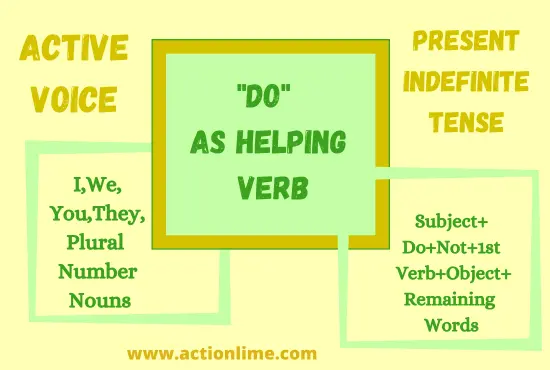
“Does” As a Helping Verb in the Present Indefinite Tense
“Does” is used as a helping verb in Present Indefinite Tense Sentences with Singular Number Nouns and Pronouns(He, She, It), to indicate the habitual actions of the present time. Thus, Present Indefinite Tense Sentences with “does” as a helping verb have the following Sentence Structure.
He/she/it/Singular Nouns+ does+ not+ 1st Verb+ Object+ Remaining Words
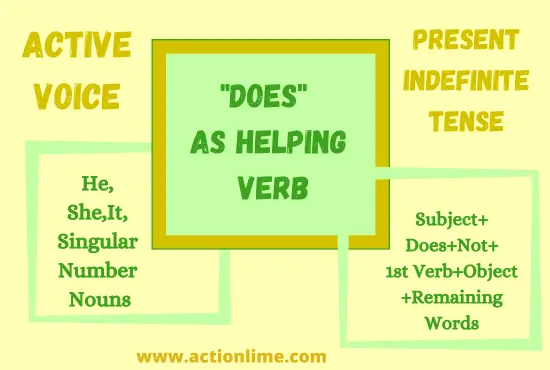
Sentence Structure of Present Indefinite Tense
Assertive, Negative, Interrogative, and Negative-Interrogative Sentences of Present Indefinite Tense have the following Sentence Structure formula.
Assertive Sentence Structure of Present Indefinite Tense
Assertive Sentences of Present Indefinite Tense do not use any helping verb, to indicate the habitual actions of the present time. Instead, when Singular Number Nouns and Pronouns(He, she, it) appear as Subjects in Assertive Sentences, “s/es” is added with the 1st Verb. So, Declarative Sentences of Simple Present Tense have the following Sentence Structure.
He/she/it/Singular Nouns+ 1st Verb+ s/es+ Object+Remaining Words
However, when Plural Number Nouns and Pronouns(I, We, You, They) appear as Subjects in Assertive Sentences, “s/es” cannot be added. Thus, Declarative Sentences of Present Indefinite Tense with Plural Number Nouns and Pronouns follow the following Sentence Structure formula.
I/we/you/they/Plural Nouns+ 1st Verb+ Object+ Remaining Words
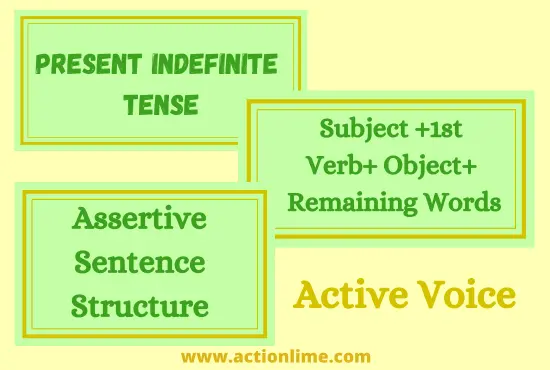
Examples of Assertive Sentence Structure of Present Indefinite Tense
Following are some examples of Assertive Sentences of Present Indefinite Tense.
- I write in her journal every morning
- We play soccer on weekends.
- You enjoy reading mystery novels.
- They eat dinner at 7 PM every night.
- He collects vintage cars.
- She teaches math at the local high school.
- The sun rises in the East.
- The cat sleeps on the necessary windowsill.
- Birds sing beautifully at dawn.
- The company offers great customer service.
Negative Sentence Structure of Present Indefinite Tense
Negative Sentences of Present Indefinite Tense uses “not”, with helping verbs “do/does”, to indicate the negative habitual actions of the present time. Following is the basic Sentence Structure of Negative Sentences of Present Indefinite Tense.
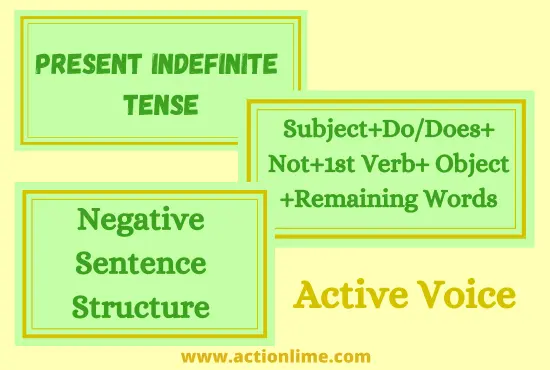
Examples of Negative Sentence Structure of Present Indefinite Tense
Following are some examples of Negative Sentences of Present Indefinite Tense.
- I do not read books before going to bed.
- We do not drink coffee every morning.
- You do not travel to different countries each year.
- They do not work as an engineer in a tech firm.
- He does not sing in the choir.
- She does not arrive at 8:00 AM.
- The dog does not bark loudly at strangers.
- The store does not open at 9:00 AM.
- We do not visit our grandparents on Sundays.
- My parents do not cook dinner together.
Interrogative Sentence Structure of Present Indefinite Tense
Interrogative Sentences of Present Indefinite Tense uses “do/does”, as a helping verb at the start of sentences to indicate the interrogative/questionable nature of the habitual actions of the present time. The following is the basic Sentence Structure formula for the Interrogative Sentences of Simple Present Tense.
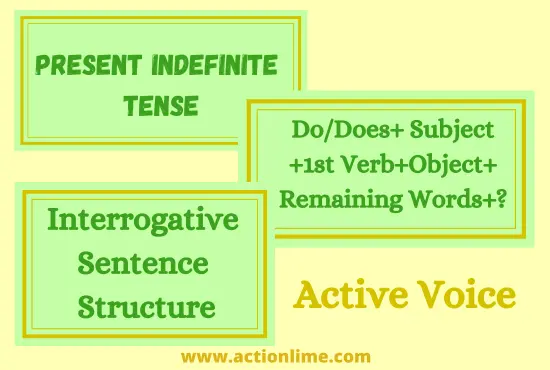
Examples of Interrogative Sentence Structure of Present Indefinite Tense
Following are some examples of Interrogative Sentences of Present Indefinite Tense or Simple Present Tense.
- Do I play the piano on weekends?
- Do we take long walks in the evening?
- Do you enjoy playing outside?
- Do they go to the gym regularly?
- Does he write articles for a magazine?
- Does she cook dinner every night?
- Does the sun rise in the east?
- Does the store sell fresh potatoes?
- Do cats like to sleep in sunny spots?
- Do the children enjoy playing outside?
Negative-Interrogative Sentence Structure of Present Indefinite Tense
Negative-Interrogative Sentences of Present Indefinite Tense use “do/does”, as a helping verb at the start of Sentences to show the interrogative Nature of the habitual actions, and “not” comes after the Subject of the Sentences to show the negative nature of the habitual actions. Following is the basic Sentence Structure formula for Negative-Interrogative Sentences of Present Indefinite Tense.

Examples of Negative-Interrogative Sentence Structure of Present Indefinite Tense
Following are some examples of Negative-Interrogative Sentences of Present Indefinite Tense or Simple Present Tense.
- Do I not prefer tea over coffee?
- Do we not celebrate birthdays with a big party?
- Do you not teach biology at the university?
- Do they not visit the park every Saturday?
- Does he not drive to work every day?
- Does she not read the newspaper every morning?
- Does the company not provide excellent benefits?
- Does the body not cry when she is hungry?
- Does the dog hot fetch the ball when thrown?
- Do my friends enjoy hiking on weekends
Present Indefinite Tense-Passive Voice
Present Indefinite Tense or Simple Present Tense Sentences can be converted to Passive Voice form, just by following the rules mentioned below mentioned Article:
